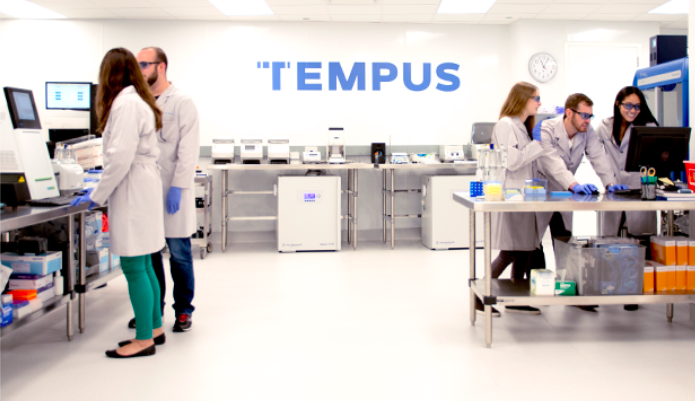Eric Lefkofsky’s Self-Funded Mission to Cure Cancer Through Data
Eric Lefkofsky doesn’t like starting new companies. At least not at this stage in his career.
The 47-year-old serial entrepreneur, along with his business partner Brad Keywell, has taken multiple startups public, made a fortune along the way, and built a legacy as one of the most successful tech founders in Chicago.
But then his wife got cancer, and everything changed.
“Most of us have the same reaction” when dealing with a cancer diagnosis, Lefkofsky said. “I can’t believe how confusing this is. I can’t believe that it isn’t more clear what I should do. I can’t believe I don’t have access to more information and more data.”
And thus was born Tempus, the latest venture from Lefkofsky and Keywell that takes a data-driven approach to cancer treatment. The startup uses machine learning and genomic sequencing to better understand a patient’s tumor, and tailors a treatment plan best suited to combat it. Tempus is Lefkofsky’s focus (Keywell is the CEO of predictive analytics startup Uptake), and it’s an ambitious swing at an industry unlike anything Lefkofsky has tackled in the past.
In an interview at his Tempus office, Lefkofsky said he believes Tempus is at the “frontline of a technology paradigm shift” within healthcare, comparing the startup in a way to how Google ushered in a new internet experience, and how Facebook changed how we connect with each other.
“We are at the epicenter of what I think is the most compelling technology paradigm shift I’ve ever seen,” Lefkofsky said. “Which is, how do you peer inside the human body and look at people’s molecular composition, and use data to actually guide care and usher in precision medicine?”
“I don’t like starting companies”
Lefkofsky, whose net worth is $1.7 billion according to Forbes, said he’s willing to put “hundreds of millions” of his own money into Tempus in order for it to stay self-funded, an advantage over competitors who rely on outside funding to stay afloat.
“Unlike other companies in the space, we don’t need capital,” he said.
It’s a major investment for Lefkofsky, who admits Tempus was not a company he planned to launch after he left the CEO role at Groupon.
WE WERE GIVING BETTER TECHNOLOGY TO TRUCK DRIVERS…THAN WE WERE GIVING DOCTORS MAKING LIFE AND DEATH DECISIONS
“I don’t like starting companies, especially at this stage in my life,” he said. “There’s a lot of pressure with starting a company, especially when you’ve had so many startups that are successful. Starting another one, it weighs on you.”
“For me Tempus was really born out of a problem that needed a solution, and the bigger that problem was in my life, and the more I felt like I had a solution, the more I felt compelled to start a company,” he added.
Fighting cancer became personal for Lefkofsky when his wife Liz was diagnosed with breast cancer. As he went with her to treatments, met doctors and specialists, and shared with her in the confusion many cancer patients feel during their treatment, Lefkofsky wondered how doctors didn’t have access to more data to help them make decisions.
“I was amazed that we were giving better technology to truck drivers [through Echo Global Logistics, one of Lefkofsky’s other companies], than we were giving doctors making life and death decisions,” he said.
Scaling a cancer startup
So 18 month ago, Lefkofsky and Tempus got to work. The startup is building a molecular clinical library of patient information and an operating system to make the information useful for physicians. The centralized database allows physicians to learn from cancer patients that came before, find people that have similar molecular and clinical profiles as their current patients, and find treatment options that are more likely to be effective.
The startup has formed partnerships with around a dozen healthcare organizations, including the Mayo Clinic, Northwestern University, the University of Chicago, and the University of Michigan. Oncologists at these cancer centers send their patients to Tempus, and then they’re sequenced in the startup’s lab. Tempus pairs the patient’s molecular and clinical information, then issues a report back the physicians and gives them access to the operating system.
That information allows the doctor to see what mutations a patient has, and see which treatment options have proven effective in the past with the specific mutation.
It’s a process that requires quite a bit of medical expertise (the company has several physicians on its executive team), but don’t be confused: Tempus is a tech company. The startup has grown to more than 150 people, many of which are data scientists, and Lefkofsky said the company is adding about three to five new people every week.
“It’s nice to be making some of the best music you’ve ever made”
Tempus is a major departure from Lefkofsky’s other ventures like local commerce (Groupon), logistics (Echo), and marketing (InnerWorkings), all three of which have gone public. But he said Tempus has the chance to be bigger than any of his previous companies, calling Tempus’ technology the “most disruptive model I’ve ever seen.”
“I didn’t think at 47 that I would be building a company that in my mind would be possibly the biggest company I’ve ever built, and the most meaningful in every metric,” he said.
Measuring Tempus’ success isn’t something you can determine month to month. It will take time, likely years, to know if the treatment options physicians use based on Tempus’ data helped save lives. But the company has quickly garnered favor from top cancer clinics, and Lefkofsky is willing to bet big money that Tempus will be his most successful company to date.
“It’s a little bit like a band that makes music,” he said. “I think if you’re like U2 or the Rolling Stones or somebody, and you make great albums, I’d imagine you kind of wonder if you’re ever going to make another great album … And I feel like with Tempus, it’s nice to be making some of the best music I’ve ever made.”
Source: American Inno


